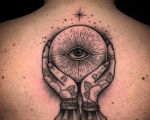Why Tattoos Are a Form of Self-Expression
As someone who has always admired the art of tattooing, I’ve come to realize that tattoos are much more than just designs etched into the skin. They are powerful forms of self-expression, an ancient practice that continues to evolve and find new meaning in the modern world. For many, tattoos represent more than just an aesthetic choice—they are an extension of one's identity, experiences, and personal values.
In this article, I’ll delve into why tattoos are such an important form of self-expression and explore how this practice has resonated with people across the globe. Whether it’s a way to commemorate a life-changing event or simply a method of telling a story, tattoos offer individuals a unique opportunity to express themselves in ways that words often cannot.
1. Tattoos Reflect Personal Identity
One of the primary reasons people get tattoos is to express their personal identity. These permanent marks on the body are often a reflection of who someone is, where they’ve been, and what they stand for. A tattoo can be an external manifestation of one’s inner self, whether it’s a design that represents a person’s heritage, interests, or values.
For example, I once met a traveler who had a tattoo of a compass on his arm. He explained that it symbolized his love for exploring new places and the guidance he found through his journeys. To him, the compass was more than just a design; it was a reminder to always follow his heart and remain true to his adventurous spirit.
Similarly, many people choose tattoos that symbolize their beliefs or life philosophies. A tattoo of a dove might represent peace, while a phoenix could symbolize resilience and the ability to rise from adversity. These designs allow people to share pieces of their identities with the world and serve as a source of personal empowerment.
2. Tattoos Tell a Story
Tattoos have long been used to tell stories, whether they’re personal, cultural, or historical. Every tattoo has a unique story behind it—stories of love, loss, triumph, and more. Getting a tattoo is a deeply personal experience, and the design is often connected to a pivotal moment in the person’s life.
For instance, a woman I know has a tattoo of a tree on her back, with roots spreading down her spine. It was inspired by her journey of self-discovery and her decision to reconnect with her family’s roots. Each branch of the tree holds significance to a key chapter of her life. To her, the tattoo isn’t just a decoration; it’s a visual representation of the journey she has taken, and it carries immense emotional weight.
Whether it’s commemorating a loved one, marking the end of a relationship, or celebrating a significant achievement, tattoos provide an avenue for individuals to immortalize their personal narratives in an unforgettable and tangible way.
3. Tattoos Represent Emotional and Mental Healing
Tattoos often serve as a form of emotional or mental healing, allowing people to reclaim power over their lives and bodies. Many individuals choose tattoos to represent the healing process they’ve gone through after trauma or hardship. For some, tattoos symbolize the strength to overcome challenges, and the artwork becomes an outward sign of inner growth.
I recall speaking with a man who had several tattoos related to his struggle with mental health. One tattoo, a semicolon, symbolized his decision to continue his journey despite the obstacles he faced. This symbol, which is often associated with mental health awareness, represented a turning point in his life when he chose to fight back against depression and anxiety. His tattoo was a reminder to himself that his story wasn’t over, and it gave him the strength to keep moving forward.
For many people, tattoos become a healing tool—something to help them take control of their narrative and transform their past pain into a symbol of strength.
4. Tattoos Can Challenge Societal Norms
Tattoos have long been viewed as symbols of rebellion and resistance, and for some, getting a tattoo is a way of challenging societal norms. For many years, tattoos were associated with countercultures and marginalized groups. But in recent decades, tattoos have become more mainstream, and people of all walks of life have embraced the art form.
People often use tattoos to make statements about individuality and defiance. A tattoo can be a way of rejecting societal expectations and embracing personal freedom. This is especially true in cultures where tattoos are considered taboo or are associated with criminality or rebellion. By getting a tattoo, individuals may be making a bold statement about their autonomy and freedom of expression.
For example, women in many societies have been subjected to restrictive beauty standards. Tattoos offer a way to break free from these constraints and assert one’s own identity. For many women, getting tattoos has been a way to reclaim their bodies and express their uniqueness on their own terms.
5. Tattoos Foster a Sense of Community
While tattoos are a form of individual expression, they can also foster a sense of belonging and community. People with similar tattoos often share a bond that transcends words, creating an unspoken connection. Tattoos can unite people who have similar interests, values, or life experiences.
For instance, I’ve met individuals with matching tattoos to commemorate their time in the military. These tattoos serve as a reminder of the shared experiences they had during their service, creating a sense of camaraderie and solidarity. Similarly, people who share a passion for music, sports, or art often express their love for these things through tattoos, creating a sense of belonging within a community.
6. Tattoos Empower People to Own Their Bodies
In a world where body image and appearance are heavily scrutinized, tattoos provide a way for people to take ownership of their bodies. Rather than conforming to mainstream beauty standards, many choose tattoos as a means of self-empowerment and self-affirmation. Tattoos allow people to mark their bodies with their own choices, expressing their identity in a way that feels authentic to them.
In my own experience, getting a tattoo was a personal choice that helped me feel more connected to myself. It wasn’t about impressing others or following trends—it was about claiming a piece of my identity and marking it permanently. For me, the tattoo became a symbol of confidence, self-acceptance, and authenticity.








